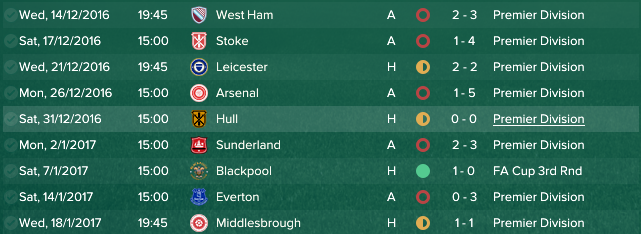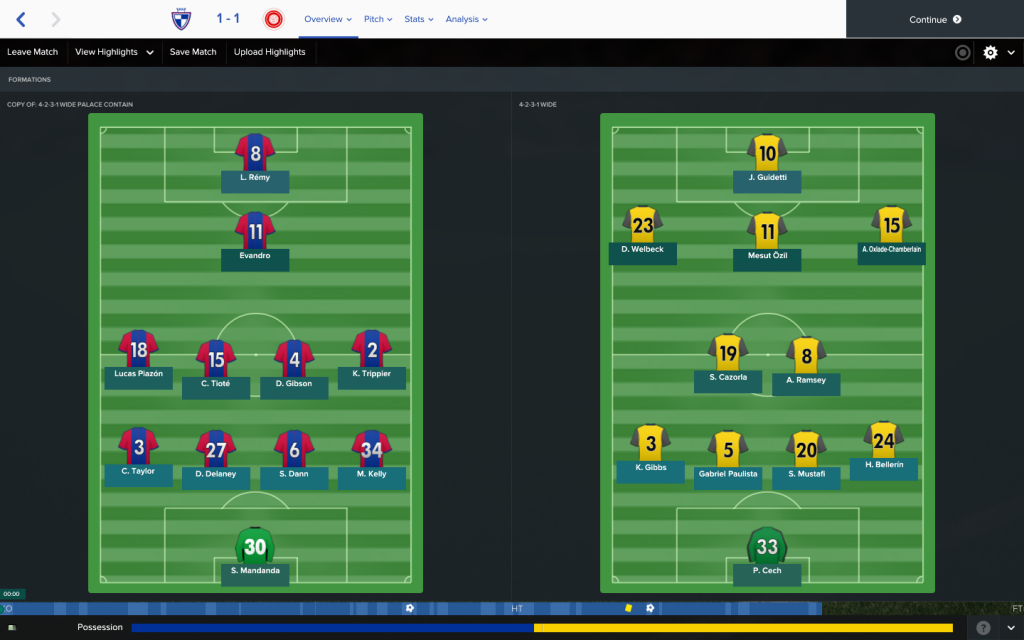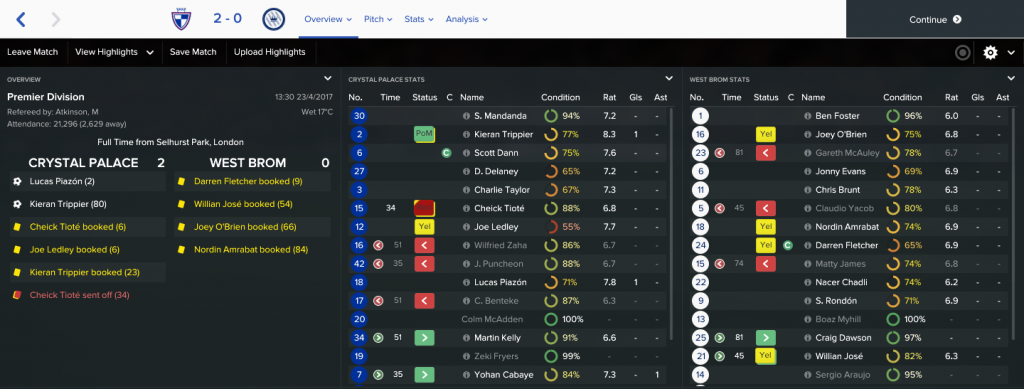It’s rare to find any Football Manager player who has never experienced a slump in form. Whether they’ve been hampered because of injuries, had their squad blown apart by transfer dealings or simply been found wanting tactically, most managers will have experienced the gut drop moment where it’s clear things aren’t working.
I had precisely that feeling in a coffee shop a couple of weeks ago. My Crystal Palace team were sitting pretty in the top half of the Premier League table in early December 2016. Things were going well, we looked set for a solid mid table finish and should have been looking to prepare for a proper assault of the top half. But by the end of January – and after an increasingly desperate number of consolatory flat whites – we found ourselves dragged into a relegation battle after a run of eight games without a win.
Still, despite those problems, I did eventually pull us out of the death spiral. Though we finished the season in 15th, our final 12 games of the season yielded six clean sheets and 13 points – not sublime form, but considering that four of those matches were against Arsenal, Chelsea, Liverpool and Manchester United I was desperately relieved that we avoided the job.
How did I do it though? What follows is a little insight into how I stopped this particular slump just in time and what I hope you can learn from it. To help speed things along, I’ve broken the piece into four numbered sections – each one should help you get into my way of thinking as quickly as possible.
1) Admitting you have a problem
The first step to solving a slump is acknowledging that your team is having one. This might seem like a bit of an idiotic thing to say; after all, you know when your team is having a tough time of it. But actively saying “we’re in trouble here” matters because it focuses your mind on solving the problem.
With Palace, I took too long to admit that we were getting into a tough spot. While we went on a truly awful run over the festive period, there were results sprinkled through October that should have acted as warning signs: the 1-0 defeat against Watford where we couldn’t take our chances; our 5-0 battering at home against Manchester United where our defence completely folded under injury pressure; the 4-1 away defeat against a struggling Stoke side.
But I didn’t say I had a problem because I was explaining things away. We were missing both Christian Benteke and Jason Puncheon in that period, so we would surely improve once they returned…right? And with games against Sunderland, Hull and Middlesbrough coming up soon, we were definitely going to be back on track by mid January weren’t we?
Dear reader, we weren’t. Instead of admitting there were problems with the number of chances I was creating and with the number of goals I was conceding, I prayed that time would redeem me. And it didn’t.
So when you’re in a bad position, just admit it to yourself. Take a deep breath, say that you need to make a change and get on with sorting the problem out. It’ll make you feel a bit grumpy in the short term, but it’s essential to cutting out the problems over the rest of the season.
2) Identifying the precise cause of the slump
Once you’ve admitted you have a problem on your hands, you can begin to start resolving it. And though I was down in the dumps, I was fortunate enough to have a team performing so badly that I knew the biggest failing my Palace team had: we were conceding too many goals.
Between the first weekend of December and the end of the festive period in January, we conceded 23 goals in eight games. In general, any football team conceding an average of two goals a game are pretty screwed and we were hovering just under three. Diabolical, I know.
But diagnosing precisely why that happened wasn’t easy. So to discover the root of the problem, I examined:
• The matches themselves, where I was looking closely at how we were conceding and identifying the areas where goals were coming from.
• Player ratings to see where individual performances were slack and to see whether anyone in particular was struggling to pull their weight.
• The team report screen to see where our weaknesses in the squad were, both on the pitch and in terms of personnel, to see if any obvious problems leapt out of me.
The answer to the question of “why you so bad at defending” came pretty quickly after I looked at each of those. In particular, our problems could be summarised as thus:
• We were utterly bobbins at defending corners, conceding too many through balls in the middle of the park and Charlie Taylor was leaving too much space at left back for wingers to get in behind him.
• Although Taylor’s flank was where a lot of goals came from, he was actually performing reasonably well in defence and having a real impact delivering balls. But our right back Martin Kelly was struggling, James Tomkins was having a mare at left centre back and Steve Mandanda was out of form.
• The team report identified a lack of aggression and a disappointing work rate in the squad. This was not a problem when we were playing well, but when you’re in a rut you need players capable of driving themselves – and the team – onwards.
So with that, I had the outlines of the problem at the back. And while we were struggling going forward – with only 10 goals scored across our awful run – the priority was clearly plugging the leaks at the back. If we could record enough clean sheets, we could feasibly draw our way to safety. This left me with one thing to do – stop the slump in its tracks.
Gulp.
3) Solving the problem
Whenever you set out to resolve a slump in Football Manager, it’s worth remembering that even a thought out approach might not solve the problem.
As I mentioned earlier when discussing the variables that lead to a bad run of form, there are usually plenty of factors in play. If a few things go against you (such as a badly timed suspension or a few injuries), then even a well thought through plan can fail. You can even experience what Alex Stewart did in the FM project, which is getting the sack when you’re actually stabilising the team. Ouch.
Still, there is no point in sitting around doing nothing because things might not work out. So instead of twiddling my thumbs and hoping Yohan Cabaye could finally learn to put a tackle in, I switched things up.
First, I made a tactical shift. In the early portion of the season, I was playing a 4-2-3-1 with a standard mentality and flexible approach. We had an attacking left back, an attacking right winger and a target man on support with a shadow striker in behind. And in the centre of midfield, we had a central midfielder on defence (Joe Ledley) and a deep lying playmaker on support (Cabaye) to provide cover.
But with the goals raining in, something had to give. So while I kept the same shape, I dropped the left wing back role to a defend duty, changed Zaha’s duty on the right wing to support and shifted the midfield two to a central midfielder on defend and (initially) a box to box midfielder. I also changed our flexibility to structured, shifted to a counter mentality and set an instruction to “be more disciplined”, as well as changing our set piece defending approach to make sure everyone was back in the box to head stuff away.
Second, I plunged into the transfer market to improve the squad as quickly as possible. The sale of James McArthur – a talented deep lying playmaker but one who didn’t fit within our side – to Swansea prompted the purchase of Kieran Trippier, to improve on Kelly, and Cheick Tiote, who came in specifically to provide aggression in the midfield. We also added Darron Gibson on loan for the same reason, as well as bringing in Lucas Piazon to improve on the generally ineffectual Andros Townsend in the inside forward position.
Finally, I took a much more pragmatic look at the remainder of the season. The games against Chelsea, Man City, Spurs, Manchester United, Liverpool and Arsenal were each written off as likely defeats and we would simply shut those games down. I created a system where the wingers were shunted back to wide midfielders alongside the centre mids, the wing backs turned to defensive full backs and our mentality was changed to defensive, which was only used for these games.
But beyond that, we looked to games against anyone from Southampton downwards as an opportunity to get a clean sheet, secure at least a point as a result of it and then try to nick a win.
Initially, results were a bit all over the place. A comprehensive 4-0 thumping of Swansea away from home was immediately followed by a diabolical 6-1 defeat against Bournemouth, which was the worst result of the entire season. But slowly and steadily, things started looking up.
In the matches where I wrote off any chances of getting points, we conceded 13 times against the top sides. In comparison, we conceded 16 times against the same teams in the first half of the season despite the fact that we were ”on form” at the time. And though we got fewer points in these matches (1 vs 4), we were not on the receiving end of any demoralising four or five goal batterings.
More importantly, we started to pick clean sheets up effectively against the teams we did need to perform against. After the debacle of the Bournemouth match, I switched the box to box midfielder to a ball winning midfielder to tighten things up even further and accepted that the only way we would get anything is by keeping zeros in our conceded column.
From then onwards, we picked up clean sheets against Leicester, Southampton, Watford, Burnley, West Brom and West Ham in the league. And when we didn’t keep a shut out, it was due to individual brilliance (e.g. an Imbula wonder strike for Stoke in our 1-0 defeat against them) rather than incompetence on our side.
As a result, we were so tight at the back that our relatively poor performances at the other end of the pitch didn’t matter. A scrappy 2-0 win against West Brom secured by a scrappy Lucas Piazon opener and a Kieran Trippier 20 yard drive proved atypical: solid at the back, a little lucky in attack but generally worth the win.
This was enough to see us through the season. Things got exceptionally tense after a run of three 2-0 defeats against top teams briefly put us in the relegation zone. But our boring solidity helped saw us pick up 8 points in our final five games – with our defence only conceding 2 times – and saw us through to a safe 15th place finish.
Getting out of the mire wasn’t pretty. We didn’t play scintillating attacking football, we certainly didn’t score many goals and there is no way that I’d ever sit down with FM and go “yeah, that’s exactly how I want to set a team up”. But it worked: we stayed up, I lived to fight another day and my new contract has given me two years to work on the problem over a longer period of time.
4) Conclusions
Arresting a downturn is about taking thoughtful action at a decisive moment. Passively playing games in the hope that whatever problem you’ll have will resolve itself doesn’t work. Instead, you need to take ownership of the problem and find a way to meaningfully resolve it.
To do this, you need to gather as much information as possible to identify the source of your problem. Once you have, either use squad rotation, transfers, tactical tweaks or a combination of all three to begin resolving the problem.
And while you’re doing it, try to keep track of the bigger picture too. Slumps are draining in FM because they force you to narrow your focus to short term results. This can lead you to feel demotivated because a) losing is never fun and b) you lose sight of the bigger project that will stop the downturn from feeling temporary.
So as a last tip, assign yourself a long term goal you want to achieve once you’re out of downerville. My ambition was to sack all of Alan Pardew’s remaining useless staff, replace them with quality coaches across the continent and use that expertise to bring through a young British inflected squad.
And although I spent the season worrying about whether I was getting my P45, the moment I got the new contract after the rescue job I felt reinvigorated the moment I was able to kick Keith Millen out of his office. You can get pleasure in all sorts of places nowadays.
So yes, slumps are a nightmare in FM. But as long as you slow down, take a deep breathe and actually address the problems that your team is having when one takes place, you’ll find that you can get your way out of the doghouse more often than not.


